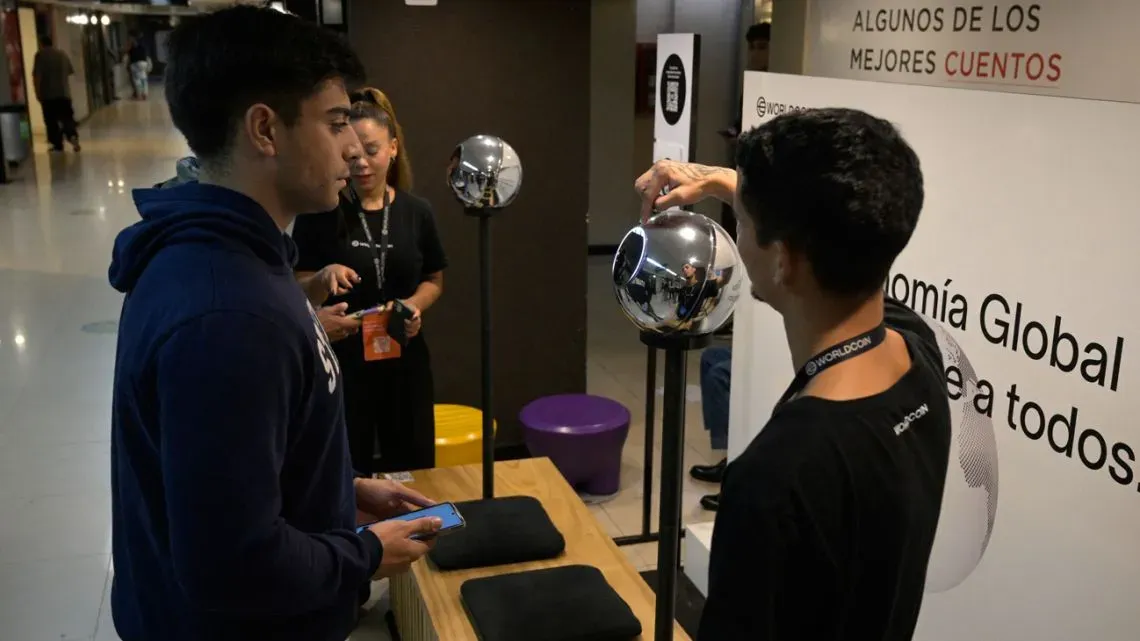
The award for the worst birthday present of the year goes to the 194 million pesos ($210,000) fine the authorities of Buenos Aires 'gifted' the Worldcoin Foundation on the day it celebrated its first year.
Issued by the provincial Ministry of Production, Science and Technological Innovation of Buenos Aires, the fine was accompanied by a demand that the protocol suppressed "the abusive clauses in its terms and services."
"The Worldcoin Foundation is surprised by the recent fine," said a company representative when contacted by Biometric Update. "The Foundation believes there is a fundamental misunderstanding of the facts and the legal framework and will appeal this decision, confident in its position and the precedents set by competent courts."
The Argentinian Pickle
The Buenos Aires authorities started investigating the sites where the iris-scanning "Orbs'" were operating at the beginning of the year.
The investigation found the operators didn't request proof of identity from users nor display warning signs about the minimum age to sign up being 18. They also highlighted several contradictions between the official information provided by Worldcoin and what was happening in the Worldcoin locations.
The Provincial Ministry demanded that the Worldcoin Foundation erase the contract clause that states Worldcoin can terminate the service at any point with no reparation to users, one that forces users to renounce collective claims, and clauses that assert Argentinian users must abide by the laws of the Cay
man Islands and, in case legal disputes arise, that they ought to be settled in Californian courts.
The ministry pointed out that one of the most striking contradictions was "what is expressed in the adhesion contract regarding the storage of biometric data."
While the contract states the iris scan data are immediately deleted from the 'Orbs', according to the investigation, it also says that the information is stored in other countries.
"On the one hand they answer that they are kept in the Orb and destroyed and on the other hand in the contract they are stored in other countries. They still do not answer us where the personal biometric data of the citizens of Buenos Aires are stored."
Persistent Regulatory Controversies
Last month, Worldcoin announced it would hire 50 qualified workers and open 50 Worldcoin sites in Argentina, naming the country a "Worldcoin hub for the region."
Latin America has become a region of increased focus for the ambitious global identity network, having recently opened up iris-scanning sign-up locations in Ecuador and Columbia.
While the "Orb" machines have been temporarily and permanently banned in countries in Africa, Europe, and Asia, the authorities of Latin American countries have, until now, kept the path cleared for the crypto identity venture to do its business.
In the European Union, Worldcoin faces its biggest regulatory challenge to date. For the past year and a half, the data protection authority of Bavaria (BayLDA) in Germany has been conducting an investigation into the company. If the project is found to be breaking the law, it will become impossible for Worldcoin to operate in any of the 27 countries of the political union.
Portugal and Spain's data protection authorities were also separately investigating the crypto project, but they have handed the case to BayLDA, which is now the sole and lead supervisory authority determining the legality of Worldcoin's actions and those of its umbrella company, Tools For Humanity.
Update In The Grant Policy
Worldcoin Foundation recently announced that it would change its user-reward schedule and name from bi-weekly grants to a monthly airdrop on the same day the user created his WorldID.
At the moment, users are granted 65WLD (around $148.85), which is distributed twice a week for twelve months after they create a Worldcoin digital passport.
Clarity around the dates of the grant distribution has been an issue, with users frequently pointing out failures and asking for help on online discussion forums dedicated to the protocol.
The amount distributed each week, around 5 to 6 WLD coins, can be a lifeline for users in some of the countries where Tools For Humanity set up the "Orbs" operators, as some citizens in territories such as Argentina, Venezuela, and Kenya face extreme poverty.
Because of this, civil society groups have accused the identity protocol of unfair business practices and exploitation of the poor.
In Singapore, an investigation by The Straits Times recently discovered that migrant workers were being 'hired' for the local equivalent of $45 - less than 50% of what they would get directly via the app - to create a WorldID and give away their account immediately after.

